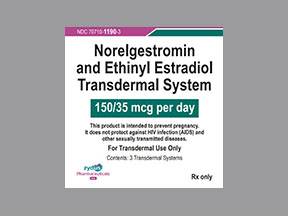Zafemy is a limited distribution medication.

Zafemy Coupons & Savings Card – Discount Prices from $46.97
Brand for: Norelgestromin-eth estradiol
My prescription
Edit
150-35MCG/24HR, Norelgestromin-eth Estradiol (3 Patch Weeklies)
Select pharmacy

CVS
$74.49
COUPON PRICE
Walgreens
$46.97
COUPON PRICE
Albertsons
$109.38
COUPON PRICE
Walmart
$117.55
COUPON PRICEZafemy savings card
Show this card to your pharmacist
Walgreens
$46.97
BIN
ID
PCN
GRP
015995
LHKPY244265
GDC
DR33
Powered by
Price history for Zafemy (brand) & Norelgestromin-eth Estradiol (generic)
3 Patch Weeklies, 150-35MCG/24HR
Average retail price for Zafemy
Average retail price for Norelgestromin-eth Estradiol
Average SaveHealth price for Norelgestromin-eth Estradiol
Our price history data is based on aggregated prescription data collected from participating pharmacies in America. Our prescription data updates daily to reflect the latest price changes. If you notice a missing data point, it means there wasn't sufficient data available to generate a monetary value for that date.
Over the last 12 months, the average discount price of Zafemy is $89.20 using the SaveHealth savings card. That's an average savings of -3.25% on Zafemy with our discount card.
*Retail prices are based on pharmacy claims data, and may not be accurate when we don't have enough claims.
Zafemy (Norelgestromin-eth Estradiol) dosage forms
Dosage Quantity Price from Per unit 150-35MCG/24HR 3 Patch Weeklies $74.49 $24.83 150-35MCG/24HR 1 Patch Weekly $37.03 $37.03
| Dosage | Quantity | Price from | Per unit |
|---|---|---|---|
| 150-35MCG/24HR | 3 Patch Weeklies | $74.49 | $24.83 |
| 150-35MCG/24HR | 1 Patch Weekly | $37.03 | $37.03 |
What is the drug Zafemy used for?
Zafemy is a transdermal patch used as a form of hormonal contraception to prevent pregnancy. It contains a combination of estrogen and progestin hormones, which work by preventing ovulation, thickening cervical mucus, and altering the uterine lining to prevent fertilization and implantation.
What is the difference between Zafemy and twirla?
Zafemy and Twirla are both transdermal contraceptive patches, but they differ in their formulation and application. Zafemy, previously known as Xulane, contains ethinyl estradiol and norelgestromin, while Twirla contains ethinyl estradiol and levonorgestrel. Additionally, the adhesive and patch size may vary between the two, which can affect user preference and skin sensitivity. Both are used to prevent pregnancy by releasing hormones through the skin, but the choice between them may depend on individual health considerations and preferences. It is important to consult with a healthcare provider to determine which option is more suitable.
What is the generic name for Zafemy patch?
The generic name for the Zafemy patch is norelgestromin and ethinyl estradiol.
Does zafemy cause mood swings?
Zafemy, a transdermal contraceptive patch, may cause mood swings as a side effect in some individuals. Hormonal contraceptives can affect mood due to changes in hormone levels. If mood swings are severe or persistent, it is advisable to consult a healthcare provider for further evaluation and management.
Which is better, Zafemy or Xulane?
The choice between Zafemy and Xulane, both of which are transdermal contraceptive patches, depends on individual factors such as personal health, side effects, and cost. Both patches contain similar active ingredients and work in the same way to prevent pregnancy. It is important for the individual to consult with a healthcare provider to determine which option is more suitable for their specific needs and circumstances.
